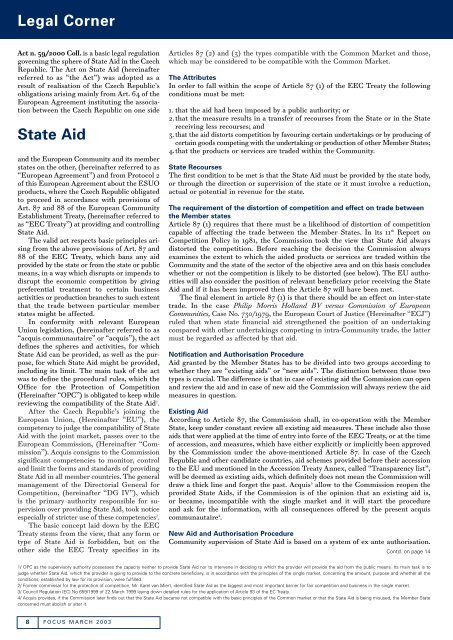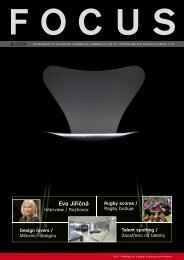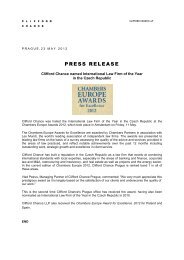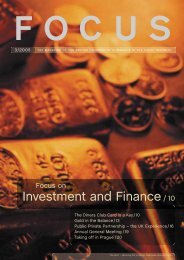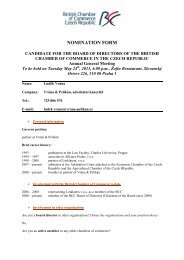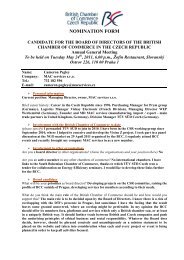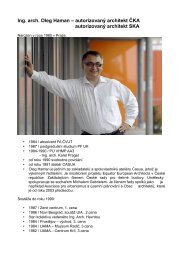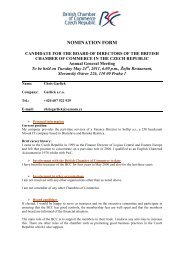Mar - British Chamber of Commerce in the Czech Republic
Mar - British Chamber of Commerce in the Czech Republic
Mar - British Chamber of Commerce in the Czech Republic
- No tags were found...
Create successful ePaper yourself
Turn your PDF publications into a flip-book with our unique Google optimized e-Paper software.
Legal CornerAct n. 59/2000 Coll. is a basic legal regulationgovern<strong>in</strong>g <strong>the</strong> sphere <strong>of</strong> State Aid <strong>in</strong> <strong>the</strong> <strong>Czech</strong><strong>Republic</strong>. The Act on State Aid (here<strong>in</strong>afterreferred to as “<strong>the</strong> Act”) was adopted as aresult <strong>of</strong> realisation <strong>of</strong> <strong>the</strong> <strong>Czech</strong> <strong>Republic</strong>’sobligations aris<strong>in</strong>g ma<strong>in</strong>ly from Art. 64 <strong>of</strong> <strong>the</strong>European Agreement <strong>in</strong>stitut<strong>in</strong>g <strong>the</strong> associationbetween <strong>the</strong> <strong>Czech</strong> <strong>Republic</strong> on one sideState Aidand <strong>the</strong> European Community and its memberstates on <strong>the</strong> o<strong>the</strong>r, (here<strong>in</strong>after referred to as“European Agreement”) and from Protocol 2<strong>of</strong> this European Agreement about <strong>the</strong> ESUOproducts, where <strong>the</strong> <strong>Czech</strong> <strong>Republic</strong> obligatedto proceed <strong>in</strong> accordance with provisions <strong>of</strong>Art. 87 and 88 <strong>of</strong> <strong>the</strong> European CommunityEstablishment Treaty, (here<strong>in</strong>after referred toas “EEC Treaty”) at provid<strong>in</strong>g and controll<strong>in</strong>gState Aid.The valid act respects basic pr<strong>in</strong>ciples aris<strong>in</strong>gfrom <strong>the</strong> above provisions <strong>of</strong> Art. 87 and88 <strong>of</strong> <strong>the</strong> EEC Treaty, which bans any aidprovided by <strong>the</strong> state or from <strong>the</strong> state or publicmeans, <strong>in</strong> a way which disrupts or impends todisrupt <strong>the</strong> economic competition by giv<strong>in</strong>gpreferential treatment to certa<strong>in</strong> bus<strong>in</strong>essactivities or production branches to such extentthat <strong>the</strong> trade between particular memberstates might be affected.In conformity with relevant EuropeanUnion legislation, (here<strong>in</strong>after referred to as“acquis communautaire” or “acquis”), <strong>the</strong> actdef<strong>in</strong>es <strong>the</strong> spheres and activities, for whichState Aid can be provided, as well as <strong>the</strong> purpose,for which State Aid might be provided,<strong>in</strong>clud<strong>in</strong>g its limit. The ma<strong>in</strong> task <strong>of</strong> <strong>the</strong> actwas to def<strong>in</strong>e <strong>the</strong> procedural rules, which <strong>the</strong>Office for <strong>the</strong> Protection <strong>of</strong> Competition(Here<strong>in</strong>after “OPC”) is obligated to keep whilereview<strong>in</strong>g <strong>the</strong> compatibility <strong>of</strong> <strong>the</strong> State Aid 1 .After <strong>the</strong> <strong>Czech</strong> <strong>Republic</strong>’s jo<strong>in</strong><strong>in</strong>g <strong>the</strong>European Union, (Here<strong>in</strong>after “EU”), <strong>the</strong>competency to judge <strong>the</strong> compatibility <strong>of</strong> StateAid with <strong>the</strong> jo<strong>in</strong>t market, passes over to <strong>the</strong>European Commission, (Here<strong>in</strong>after “Commission”).Acquis consigns to <strong>the</strong> Commissionsignificant competencies to monitor, controland limit <strong>the</strong> forms and standards <strong>of</strong> provid<strong>in</strong>gState Aid <strong>in</strong> all member countries. The generalmanagement <strong>of</strong> <strong>the</strong> Directorial General forCompetition, (here<strong>in</strong>after “DG IV”), whichis <strong>the</strong> primary authority responsible for supervisionover provid<strong>in</strong>g State Aid, took noticeespecially <strong>of</strong> stricter use <strong>of</strong> <strong>the</strong>se competencies 2 .The basic concept laid down by <strong>the</strong> EECTreaty stems from <strong>the</strong> view, that any form ortype <strong>of</strong> State Aid is forbidden, but on <strong>the</strong>o<strong>the</strong>r side <strong>the</strong> EEC Treaty specifies <strong>in</strong> itsArticles 87 (2) and (3) <strong>the</strong> types compatible with <strong>the</strong> Common <strong>Mar</strong>ket and those,which may be considered to be compatible with <strong>the</strong> Common <strong>Mar</strong>ket.The AttributesIn order to fall with<strong>in</strong> <strong>the</strong> scope <strong>of</strong> Article 87 (1) <strong>of</strong> <strong>the</strong> EEC Treaty <strong>the</strong> follow<strong>in</strong>gconditions must be met:1. that <strong>the</strong> aid had been imposed by a public authority; or2. that <strong>the</strong> measure results <strong>in</strong> a transfer <strong>of</strong> recourses from <strong>the</strong> State or <strong>in</strong> <strong>the</strong> Statereceiv<strong>in</strong>g less recourses; and3. that <strong>the</strong> aid distorts competition by favour<strong>in</strong>g certa<strong>in</strong> undertak<strong>in</strong>gs or by produc<strong>in</strong>g <strong>of</strong>certa<strong>in</strong> goods compet<strong>in</strong>g with <strong>the</strong> undertak<strong>in</strong>g or production <strong>of</strong> o<strong>the</strong>r Member States;4.that <strong>the</strong> products or services are traded with<strong>in</strong> <strong>the</strong> Community.State RecoursesThe first condition to be met is that <strong>the</strong> State Aid must be provided by <strong>the</strong> state body,or through <strong>the</strong> direction or supervision <strong>of</strong> <strong>the</strong> state or it must <strong>in</strong>volve a reduction,actual or potential <strong>in</strong> revenue for <strong>the</strong> state.The requirement <strong>of</strong> <strong>the</strong> distortion <strong>of</strong> competition and effect on trade between<strong>the</strong> Member statesArticle 87 (1) requires that <strong>the</strong>re must be a likelihood <strong>of</strong> distortion <strong>of</strong> competitioncapable <strong>of</strong> affect<strong>in</strong>g <strong>the</strong> trade between <strong>the</strong> Member States. In its 11 th Report onCompetition Policy <strong>in</strong> 1981, <strong>the</strong> Commission took <strong>the</strong> view that State Aid alwaysdistorted <strong>the</strong> competition. Before reach<strong>in</strong>g <strong>the</strong> decision <strong>the</strong> Commission alwaysexam<strong>in</strong>es <strong>the</strong> extent to which <strong>the</strong> aided products or services are traded with<strong>in</strong> <strong>the</strong>Community and <strong>the</strong> state <strong>of</strong> <strong>the</strong> sector <strong>of</strong> <strong>the</strong> objective area and on this basis concludeswhe<strong>the</strong>r or not <strong>the</strong> competition is likely to be distorted (see below). The EU authoritieswill also consider <strong>the</strong> position <strong>of</strong> relevant beneficiary prior receiv<strong>in</strong>g <strong>the</strong> StateAid and if it has been improved <strong>the</strong>n <strong>the</strong> Article 87 will have been met.The f<strong>in</strong>al element <strong>in</strong> article 87 (1) is that <strong>the</strong>re should be an effect on <strong>in</strong>ter-statetrade. In <strong>the</strong> case Philip Morris Holland BV versus Commission <strong>of</strong> EuropeanCommunities, Case No. 730/1979, <strong>the</strong> European Court <strong>of</strong> Justice (Here<strong>in</strong>after “ECJ”)ruled that when state f<strong>in</strong>ancial aid streng<strong>the</strong>ned <strong>the</strong> position <strong>of</strong> an undertak<strong>in</strong>gcompared with o<strong>the</strong>r undertak<strong>in</strong>gs compet<strong>in</strong>g <strong>in</strong> <strong>in</strong>tra-Community trade, <strong>the</strong> lattermust be regarded as affected by that aid.Notification and Authorisation ProcedureAid granted by <strong>the</strong> Member States has to be divided <strong>in</strong>to two groups accord<strong>in</strong>g towhe<strong>the</strong>r <strong>the</strong>y are “exist<strong>in</strong>g aids” or “new aids”. The dist<strong>in</strong>ction between those twotypes is crucial. The difference is that <strong>in</strong> case <strong>of</strong> exist<strong>in</strong>g aid <strong>the</strong> Commission can openand review <strong>the</strong> aid and <strong>in</strong> case <strong>of</strong> new aid <strong>the</strong> Commission will always review <strong>the</strong> aidmeasures <strong>in</strong> question.Exist<strong>in</strong>g AidAccord<strong>in</strong>g to Article 87, <strong>the</strong> Commission shall, <strong>in</strong> co-operation with <strong>the</strong> MemberState, keep under constant review all exist<strong>in</strong>g aid measures. These <strong>in</strong>clude also thoseaids that were applied at <strong>the</strong> time <strong>of</strong> entry <strong>in</strong>to force <strong>of</strong> <strong>the</strong> EEC Treaty, or at <strong>the</strong> time<strong>of</strong> accession, and measures, which have ei<strong>the</strong>r explicitly or implicitly been approvedby <strong>the</strong> Commission under <strong>the</strong> above-mentioned Article 87. In case <strong>of</strong> <strong>the</strong> <strong>Czech</strong><strong>Republic</strong> and o<strong>the</strong>r candidate countries, aid schemes provided before <strong>the</strong>ir accessionto <strong>the</strong> EU and mentioned <strong>in</strong> <strong>the</strong> Accession Treaty Annex, called “Transparency list”,will be deemed as exist<strong>in</strong>g aids, which def<strong>in</strong>itely does not mean <strong>the</strong> Commission willdraw a thick l<strong>in</strong>e and forget <strong>the</strong> past. Acquis 3 allow to <strong>the</strong> Commission reopen <strong>the</strong>provided State Aids, if <strong>the</strong> Commission is <strong>of</strong> <strong>the</strong> op<strong>in</strong>ion that an exist<strong>in</strong>g aid is,or became, <strong>in</strong>compatible with <strong>the</strong> s<strong>in</strong>gle market and it will start <strong>the</strong> procedureand ask for <strong>the</strong> <strong>in</strong>formation, with all consequences <strong>of</strong>fered by <strong>the</strong> present acquiscommunautaire 4 .New Aid and Authorisation ProcedureCommunity supervision <strong>of</strong> State Aid is based on a system <strong>of</strong> ex ante authorisation.Contd. on page 141/ OPC as <strong>the</strong> supervisory authority possesses <strong>the</strong> capacity nei<strong>the</strong>r to provide State Aid nor to <strong>in</strong>tervene <strong>in</strong> decid<strong>in</strong>g to which <strong>the</strong> provider will provide <strong>the</strong> aid from <strong>the</strong> public means. Its ma<strong>in</strong> task is tojudge whe<strong>the</strong>r State Aid, which <strong>the</strong> provider is go<strong>in</strong>g to provide to <strong>the</strong> concrete beneficiary, is <strong>in</strong> accordance with <strong>the</strong> pr<strong>in</strong>ciples <strong>of</strong> <strong>the</strong> s<strong>in</strong>gle market, concern<strong>in</strong>g <strong>the</strong> amount, purpose and whe<strong>the</strong>r all <strong>the</strong>conditions, established by law for its provision, were fulfilled.2/ Former commissar for <strong>the</strong> protection <strong>of</strong> competition, Mr. Karel van Miert, identified State Aid as <strong>the</strong> biggest and most important barrier for fair competition and bus<strong>in</strong>ess <strong>in</strong> <strong>the</strong> s<strong>in</strong>gle market.3/ Council Regulation (EC) No 659/1999 <strong>of</strong> 22 <strong>Mar</strong>ch 1999 lay<strong>in</strong>g down detailed rules for <strong>the</strong> application <strong>of</strong> Article 93 <strong>of</strong> <strong>the</strong> EC Treaty.4/ Acquis provides, if <strong>the</strong> Commission later f<strong>in</strong>ds out that <strong>the</strong> State Aid became not compatible with <strong>the</strong> basic pr<strong>in</strong>ciples <strong>of</strong> <strong>the</strong> Common market or that <strong>the</strong> State Aid is be<strong>in</strong>g misused, <strong>the</strong> Member Stateconcerned must abolish or alter it.8 FOCUS MARCH 2003


